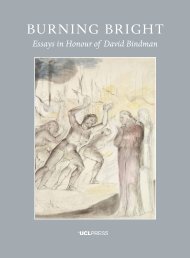Archives
TiL0x
TiL0x
Create successful ePaper yourself
Turn your PDF publications into a flip-book with our unique Google optimized e-Paper software.
kindnesse hauing since beene renewed to me by the said my friend<br />
in report of y[our] deserts hath putt me backe from expressing<br />
in this forreine language what in my owne I was not able to do<br />
before. Yet notwithstanding choosing rather to haue my ignorance<br />
discouered then my unthankfullnesse suspected, I resolued to<br />
send y[our] Lad[yship] these lines for to accompanie these poore<br />
trifles, upon w[hich] (though in their value most like their giuer)<br />
I will humble beseech y[our] Lad[yship] to bestow the honour of<br />
y[our] wearing, and sometimes at y[our] best leasure remember<br />
by them that in Holland liueth. Madam; Y[our] Lad[yships]<br />
humble and most loueing seruant D. v. D. 22<br />
The second letter, while still formal, is less conventional in its phrasing<br />
and sentiments. It vividly conveys Dorothea’s strong reaction to what<br />
appears to have been a letter of congratulation of some kind from<br />
Lady Killigrew, probably a suggestion that Dorothea was not ‘attached’,<br />
or promised in marriage to Constantijn. Such an imputation might<br />
have been entirely innocent – part of Lady’s Killigrew’s inquiries as to<br />
whether Dorothea was free to come to England, say. But the clarification<br />
of the fact that she was entirely unattached, could, of course, only<br />
have come from Constantijn, and would have been a convenient fiction<br />
if he wished to indicate his own freedom from commitment at home in<br />
order to flirt with Mary Killigrew. Either way, Dorothea took it to mean<br />
that Constantijn had declared that their past attachment to one another<br />
was at an end:<br />
Madame: I do not know what impressions my friend hath bene<br />
about to giue y[our] Lad[yship] concerning I cannot tell what<br />
change of the condition of my life: but guessing at it by y[our]<br />
Lad[yships] answeres, I dare say he doth long to see thinges<br />
brought to such an ende as he hath bene pleased to imagine, afore<br />
nor I nor anie liuing sowle thought of it. For the truth is, I do liue<br />
quietlie in the same estate, he left me and found me at his going<br />
and coming from England: neither do I see anie reason why I<br />
should wish to alter it. Howbeit, what kind of life so euer one day<br />
or other God shall be pleased to call me unto, he needeth not to<br />
feare for a while. The willing friendshipp I contracted w[ith] him<br />
euen almost from his childhood is such as no alteration will be<br />
able to alter it no, not this very unciuill doing of his. No more then<br />
22 Den Haag, Kon. Bibl., Hs. KA XLVIII, f. 56.<br />
‘Dear Song’ 77





